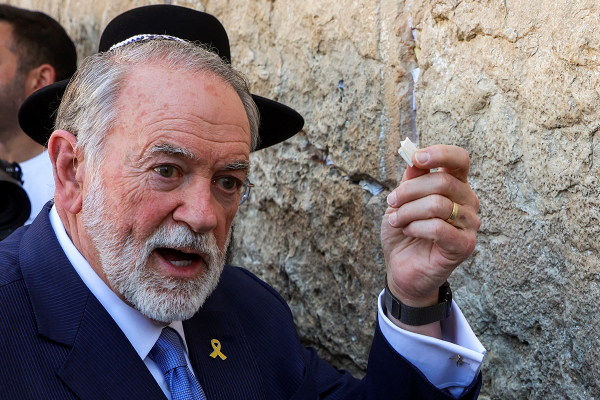Romans 7 and 8 for Catholics, Protestants and every Christian

One of the puzzling paradoxes of the Christian life is that a believer is both a "saint" and a "sinner" at the same time. The apostle Paul unraveled this mysterious union in a way that no theologian has ever been able to surpass. After all, Paul was inspired by the Holy Spirit to write much of the New Testament, and the book of Romans represents the creme de la creme of Paul's epistles.
Paul had a deep and profound understanding of both Law and Gospel. And he understood that we "would not have known what sin was except through the law." (Rom. 7:7) Paul even went so far as to say, "I found that the very commandment that was intended to bring life actually brought death." (7:10) So who or what "died" as a result of God's Law? Well, Paul had already written in the previous chapter that "our old self was crucified with Christ so that the body of sin might be rendered powerless, that we should no longer be slaves to sin - because anyone who has died has been freed from sin." (6:6,7)
That is to say, the old nature of a believer has been crucified with Christ and no longer controls the individual who has been converted through faith in Christ. Unfortunately, our old nature (also referred to as our "old man") didn't get the memo and continues to fight for life within us even though we "have been set free from sin and have become slaves to God." (6:22) I addressed this issue five years ago in an article titled, "The 'Inner Zombie' of the Christian Life."
Here is the deal. A Christian is a forgiven sinner who is now free to live for Christ. A Christian no longer has to give into temptation. Freedom from sin means among other things the freedom to choose that which is right and holy. Even then, the only good choices we make are the result of Christ living in us. I addressed this matter in the article, "Jesus Is a Believer's Justification and Sanctification."
So what gets in the way of a Christian living a fully devoted life of discipleship? Simply put, our old nature fights to stay in control of our life even though our soul has come under the authority of "new management." The apostle Paul was no exception to this inner struggle. He wrote, "I do not understand what I do. For what I want to do I do not do, but what I hate I do." (7:15) In other words, even the apostle Paul was not a perfect man. He still experienced thoughts and behavior that didn't come from the Lord, but rather, from his sinful nature. And how did Paul explain this apparent discrepancy between his profession of faith and his less than perfect life? "As it is, it is no longer I myself who do it, but it is sin living in me. I know that nothing good lives in me, that is, in my sinful nature." (7:17,18)
The inner zombie of the apostle's life had been crucified when Saul was converted, (Acts 9:1-18) and yet the apostle still experienced the rumblings of sin coming from his old nature within him. And let's be honest here. Is this not also the experience of every single Christian today? Who among us can honestly say, "I never think a sinful thought even for a few seconds. I never speak an unwise or unkind word. I never give into temptation of any kind." In reality, our struggle is very similar to what Paul experienced, and our weaknesses are just as real. This spiritual dynamic led Paul to write, "I have the desire to do what is good, but I cannot carry it out. For what I do is not the good I want to do; no, the evil I do not want to do - this I keep on doing." (7:18,19)
All of us who know Christ experience the same thing. For example, we hate to think unkind thoughts of others, and yet we continue to experience such thoughts at times. Where do these evil thoughts come from? They come from our sinful nature as it fights to maintain some measure of influence in our life. When we get to heaven one day, we will not experience any of these evil thoughts or sinful desires. But for now, the inner zombie is a daily reality we must constantly guard against. Paul wrote, "When I want to do good, evil is right there with me. For in my inner being I delight in God's law, but I see another law at work in the members of my body, waging war against the law of my mind....what a wretched man I am! Who will rescue me from this body of death? Thanks be to God - through Jesus Christ our Lord!" (7:21-25)
Paul was sold out to Jesus and he had been "set free from sin." (6:18) At the same time, he was still a sinner who experienced daily temptations and ongoing spiritual battles against his own sinful inclinations. In summing up this conflict within the soul of every believer, Paul wrote, "So then, I myself in my mind am a slave to God's law, but in the sinful nature a slave to the law of sin." (7:25) Every Christian should be able to proclaim the same thing. "I want to do God's will, but at the same time I am still involved in a daily struggle against sin. I long to obey Christ, but I also find myself coming up short on a regular basis." This is the confession of every believer who is honest with himself and who sincerely seeks to please the Lord in everything. (Eph. 5:10)
Certain religious leaders seem to feel it is their duty to cast doubt upon the salvation of some sincere Christians in their midst. Those who employ this legalistic tactic constantly push people to do more, while they themselves don't have much of a clue as to what actually constitutes biblical Christianity. True Christian discipleship is rooted in the Gospel. Compare the misguided approach of some to what Paul wrote to the believers in Rome: "Therefore, there is now no condemnation for those who are in Christ Jesus." (8:1) This powerful declaration came after Paul's extensive presentation about how God "justifies the man who has faith in Jesus" (3:26) and that believers "have been set free from sin and have become slaves to righteousness." (6:18) Paul included himself in this group of people "who do not live according to the sinful nature but according to the Spirit." (8:4)
It really boils down to what a person chooses to focus upon. "Those who live according to the sinful nature have their minds set on what that nature desires; but those who live in accordance with the Spirit have their minds set on what the Spirit desires. The mind of sinful man is death, but the mind controlled by the Spirit is life and peace; the sinful mind is hostile to God. It does not submit to God's law, nor can it do so." (8:5-7)
So where is your focus today? Are you fixing your eyes upon sinful things, or upon Jesus? If your mind has drifted away from the things of God and the cross of Christ, this would be a perfect time to repent and refocus
How else could we ever hope to please God? After all, "those controlled by the sinful nature cannot please God. You, however, are controlled not by the sinful nature but by the Spirit, if the Spirit of God lives in you. And if anyone does not have the Spirit of Christ, he does not belong to Christ." (8:8,9) In other words, the Lord lives within every Christian. As Paul made abundantly clear, "But if Christ is in you, your body is dead because of sin, yet your spirit is alive because of righteousness." (8:10) And this explains why believers "have been set free from sin and have become slaves to God." (6:22) Jesus Christ truly sets the captives free!
This doesn't mean, however, that a life of discipleship is easy. The apostle Paul endured far more than his share of suffering. (2 Cor. 11:23-33) And yet it was this insightful servant of Christ who wrote, "I consider that our present sufferings are not worth comparing with the glory that will be revealed in us." (8:18) Paul was able to see the big picture, and he knew that Jesus had already won the victory for everyone who places their faith in the Messiah. In addition, Paul wrote: "We know that in all things God works for the good of those who love Him, who have been called according to His purpose." (8:28) This particular passage has brought much comfort to Christians over the centuries, especially when going through trials and difficulties. And it was our Lord Himself who said, "In this world you will have trouble. But take heart! I have overcome the world." (John 16:33)
This eternal perspective allowed Paul to realize that Christians can "rejoice in our sufferings" (5:3) even as we "groan inwardly and wait eagerly for our adoption as sons, the redemption of our bodies." (8:23) The Holy Spirit lives within every believer (1 Cor. 6:19) and thankfully, "the Spirit helps us in our weakness. We do not know what we ought to pray, but the Spirit Himself intercedes for us with groans that words cannot express." (8:26) Not only that, but Jesus is "also interceding for us" (8:34) as our "mediator of a new covenant." (Heb. 12:24) It is only through faith in the blood of Christ shed on the cross that "we have redemption" and "the forgiveness of sins, in accordance with the riches of God's grace." (Eph. 1:7) "Christ loves us and has freed us from our sins by His blood." (Rev. 1:5)
"What, then, shall we say in response to this? If God is for us, who can be against us? He who did not spare His own Son, but gave Him up for us all - how will He not also, along with Him, graciously give us all things? Who will bring any charge against those whom God has chosen? It is God who justifies. Who is he that condemns?" "Who shall separate us from the love of Christ? Shall trouble or hardship or persecution or famine or nakedness or danger or sword?" (8:31-35) Paul wanted the saints in Rome to understand that "in all these things we are more than conquerors through Him who loved us." (8:37)
This article on chapters 7 and 8 of Romans wraps up the series I have written for Catholics, Protestants and every Christian. The 8th chapter sums up the Gospel message which Paul laid out beautifully in Galatians, Ephesians, Philippians, Colossians, and Romans. Along with all of Scripture, these five epistles present a message of power, peace and perfect redemption in Christ alone. Jesus not only changed the life of the apostle Paul, but also millions like him over the centuries. It was Paul's "new birth" (1 Peter 1:3) and his confidence in Jesus' sacrifice on the cross that led this faithful apostle to constantly extol the love of God in Christ:
"For I am convinced that neither death nor life, neither angels nor demons, neither the present nor the future, nor any powers, neither height nor depth, nor anything else in all creation, will be able to separate us from the love of God that is in Christ Jesus our Lord." (Romans 8:38,39) "To the only wise God be glory forever through Jesus Christ! Amen." (Rom. 16:27)
Other articles in this series:
"Romans 1 and 2 for Catholics, Protestants and Every Christian"
"Romans 3 and 4 for Catholics, Protestants and Every Christian"
"Romans 5 and 6 for Catholics, Protestants and Every Christian"
"Galatians for Catholics, Protestants and Every Christian"
"Ephesians for Catholics, Protestants and Every Christian"
"Philippians for Catholics, Protestants and Every Christian"
"Colossians for Catholics, Protestants and Every Christian"





















